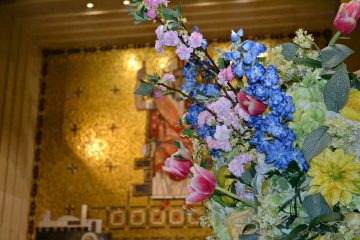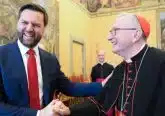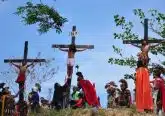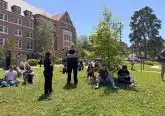Cardinal: Climate change affects all, regardless of wealth or privilege

IMAGE: CNS/Bob Roller
By Gus Hardy
SANTA CLARA, Calif. (CNS) — Ghanaian Cardinal Peter Turkson, the lead consultant on Pope Francis’ encyclical on the environment, issued a call to action in the heart of the world’s technology and communications industries — Silicon Valley.
The president of the Pontifical Council for Justice and Peace visited Santa Clara University Nov. 3-4. He specifically wished to come to the Jesuit university because of its location.
He headlined a two-day conference on climate change titled “Our Future on a Shared Planet: Silicon Valley in Conversation With the Environmental Teachings of Pope Francis.”
On the first day, he delivered several messages reflecting a common theme.
The cardinal began the day with opening remarks to university staff in which he immediately set out to ground the encyclical in the church’s traditions. He quoted Blessed Paul VI’s idea of “peace as development,” St. John Paul II’s “development in terms of the human person,” and Pope Benedict XVI’s “ecology of peace” — reminding the audience of the church’s dual history of calling for an integrated and healthy ecology as well as protection of the poor.
Cardinal Turkson emphasized dialogue throughout the day Nov. 3. Early on, he referred to dialogue as “honest and transparent conversation” without the interference of particular interests, and elaborated further on that theme over the course of the conference.
“The encyclical,” he said, “is addressed to all of us, not just university leaders and businesspeople.”
He also put emphasis on the points of ecological conversion in the encyclical, saying that the world “must have a new concern about not how much people make, but what they do.” Subsequently, he made reference to the university’s Silicon Valley location, saying that the technology hub was called to be an icon for new kinds of development for the common benefit.
During his homily at Mass later that day, he remarked on how the Gospel calls those blessed who “open themselves to the word of God and receive it,” implicitly reminded the audience of the encyclical’s call to conversion and dialogue.
Before Cardinal Turkson delivered his keynote speech in the afternoon, the university’s president, Jesuit Father Michael Engh, surprised the audience by bestowing the St. Clare medal on the cardinal.
Because the award is rarely given and is the highest honor the university can bestow — previous recipients include Mother Teresa and Jesuit Father Jon Sobrino — presenting it to Cardinal Turkson was seen as solidifying the university’s desire to be a force for ecological change.
“Real change only comes from dialogue and mobilization from below,” said Cardinal Turkson as he opened his speech before a packed audience of students, faculty and local business leaders.
“Climate acceleration is undeniable, but amenable to intervention,” he continued. “This is why we are in need of ‘Laudato Si’,’ a full social encyclical in the tradition of ‘Rerum Novarum’ to apply the church’s teachings to this day and age.”
‘Rerum Novarum,'” the 1891 encyclical on capital and labor by Pope Leo XIII, is considered the starting point of modern social teaching.
Cardinal Turkson wove church teaching and scientific issues together — blending the two in ways that his audience would be able to understand. He pointed to a prevailing “naive confidence that technological advances and a free market will automatically solve all of our problems,” tying that to the “tragedy of the commons,” where our common goods of climate and atmosphere are shared by all and abused by a few at the expense of all.
Cardinal Turkson did not dismiss all technological advances, however. Instead, he remarked that both he and Pope Francis wished that technology could be “guided ethically” with consideration of the implications of development. To back this claim up, he cited paragraphs 102-105 of the encyclical, which highlight the promises and dangers of technological progress.
Pope Francis in the document says that with technological development must come development in human responsibility, values and conscience; he calls for sound ethics and self-restraint.
The need to think critically about technological advances is necessary, the cardinal warned, given that “we are acting like a technological giant and an ethical child.”
Framing climate change as a moral issue, Cardinal Turkson reiterated the comments made by the previous popes, as well as recent pro-environmental statements by the National Association of Evangelicals. He then summed up the issues of morality in six points: climate change affects everyone and no amount of wealth or privilege will save us; all must act; we must be truthful in how we go about solving these problems; we have to embrace an integrated ecology; practice and take dialogue seriously; and finally — pray.
The encyclical’s ultimate purpose in the U.S., Cardinal Turkson concluded, was to call the country to all six points and honor its environmental traditions of conservation and preservation.
Citing the work of Msgr. John A. Ryan and his influence on the creation of Franklin D. Roosevelt’s New Deal, Cardinal Turkson urged the United States to once again take up the church’s influence in the creation and formation of public policy.
“This,” he concluded, “may well be the most important challenge of the 21st century, and we must be grounded in realities, not ideas.”
– – –
Copyright © 2015 Catholic News Service/U.S. Conference of Catholic Bishops. www.catholicnews.com. All rights reserved. Republishing or redistributing of CNS content, including by framing or similar means without prior permission, is prohibited. You may link to stories on our public site. This copy is for your personal, non-commercial use only. To request permission for republishing or redistributing of CNS content, please contact permissions at [email protected].













